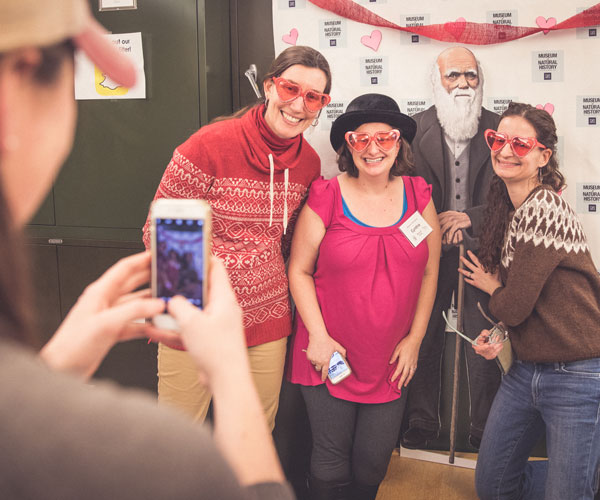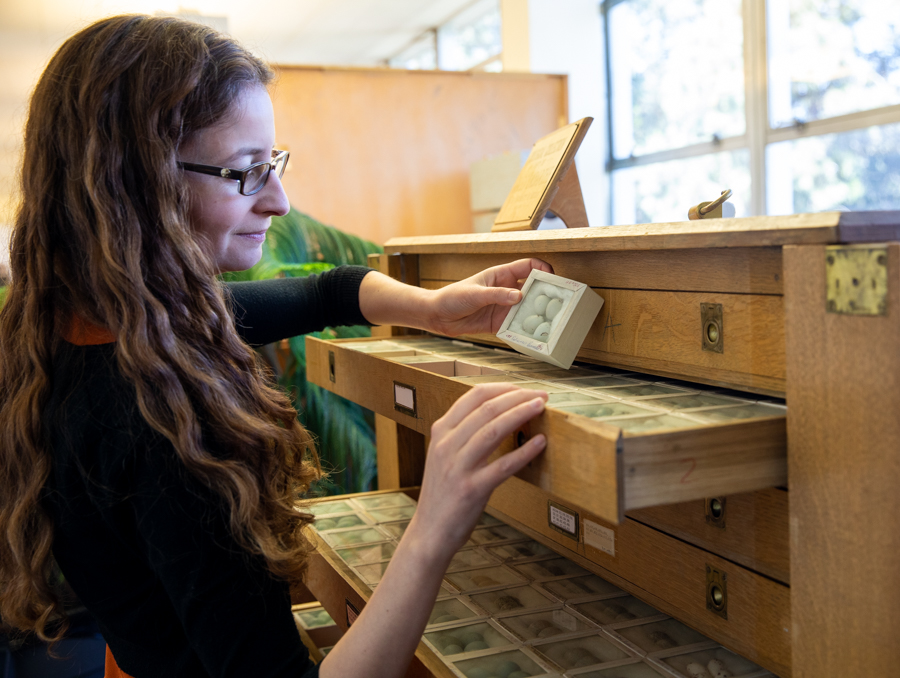Elizabeth Leger, Professor of Biology and Director of the Museum of Natural History, has been named Foundation Professor for her extraordinary contributions to research, teaching, service and outreach at the University. She began her career at the University in the College of Agriculture, Biotechnology and Natural Resources in 2006, and more recently transitioned to the College of Science and the Department of Biology in 2019 while continuing to contribute as a prominent faculty member in the Ecology, Evolution and Conservation Biology graduate program. As director and co-creator of the Museum of Natural History, Leger helped bring one of the University’s more valuable tools for research and outreach to fruition.
“Due to the efforts of Beth and her collaborator Chris Feldman, the Museum of Natural History is now one of UNR’s jewels,” Jack Hayes, Department of Biology Chair and one of four colleagues who nominated Leger for Foundation Professor. “Every year thousands of school children and members of the general public visit the Museum, and it is a great showpiece for sharing science with the Reno community.”
Parts of the vast collections that make up the Museum were previously sitting unused and mostly unorganized, in storage facility north of the University or scattered across campus. With funding from a variety of sources, including the National Science Foundation, Leger engaged graduate students and research associates in this concerted outreach effort to bring these previously unused collections together, and back to life. The Museum serves the local community but is also recognized nationally for its impressive research output and important scientific collections with specimens dating as far back as 1850.
A leading plant biologist and ecologist, Leger’s scholarly record has earned her national recognition. Her research demonstrating that native plants can develop competitive resistance to exotic invasion influenced a conceptual shift in how ecologists approach restoration ecology, and to help assess the nation’s native seed needs, Leger is serving on a National Academy of Sciences, Engineering and Medicine panel. She has published over 60 peer-reviewed papers and has been awarded more than 30 research grants. In addition, she remains dedicated to outreach and science communication, regularly presenting public lectures and demonstrations totaling more than 150 presentations over the past 15 years.
“Dr. Leger displays all of the attributes of an extraordinary faculty member with ever-increasing impact through teaching, research and service,” Katherine McCall, Acting Dean of the College of Science, said. “Her record of sustained achievement shows no sign of slowing.”
Below, Leger answers a few questions about her career, the Museum of Natural History, her ongoing research and more.
Your enthusiasm for biology, for science, and particularly for plants is infectious! What is your path to science and how did you become interested in plant biology?
You know it’s funny, whenever we read applications for graduate school, people always start with their early childhood experiences. I really do think some children pay attention to the natural world, even, if it’s only house plants or the spiders in the corners of the house, and others don’t. I was definitely that child, who was always looking at plants and bugs, and I could have told you exactly who lived where in my backyard, even though I didn’t know their official names. However, my road to becoming a biologist was definitely not linear. I started college as an English major, and was taking biology classes just for fun. It was when I took an evolution class that I really decided on the path for my future. I realized that it was possible to design experiments and actually learn new things, to be surprised by the results, and not just operate based on your opinions about the world. There are facts out there and you can find them, and scientists are doing that on a continuous basis. That was completely compelling, and I never looked back.
You are also Director of the Museum of Natural History here on campus. What role do you see the Museum playing here on campus with our faculty and students and in the wider community?
If you learn to recognize the plants and animals around you, you will never be bored! I love that we can help people get to know their backyard in so many different ways.
Yes! I absolutely love our museum. It is really the only such resource in town, and I love that it’s a place where people can come see plants and animals of the Great Basin, and talk with our fabulous scientists who study them. Not during a pandemic obviously, and that has been sad. Because more and more people are spending time outside, I think there’s a real hunger to know what lives around us. Students who take classes in natural history-related subjects really get excited about learning the names of things they see every day, and how to look closer. In the museum, we are able to open this opportunity up to more and more people, including undergraduate students studying art, literature, and education, not to mention the general public and school groups. If you learn to recognize the plants and animals around you, you will never be bored! I love that we can help people get to know their backyard in so many different ways.
What’s your hope for the future of the Museum of Natural History? What are you most excited about?

Leger (right) poses for a photo with Museum of Natural History Education Coordinator Cynthia Scholl (center) and Outreach Coordinator Julie Stoughton (left) at the Museum's 2019 Valentine's Day event.
Well! I’m so glad you asked. Ultimately, I envision us as the ground floor of the new life sciences building, something very much open to the public, as well as to UNR students and faculty. Rather than try to re-create the amazing dioramas and displays that you see in the major natural history museums around the world, I think our unique niche would be a museum that combines teaching, research, and outreach in the same exact space. I envision research labs with working spaces behind clear windows, surrounding an atrium with exhibits (and a coffee shop, of course) so students and the public can come visit, see our cool creatures and displays, but also get a birds-eye-view of the actual research and teaching that goes on at UNR. Turn the museum inside out, so to speak, and put the things that are usually going on in the background into the foreground. In Nevada, we have to be creative, and use all of our resources for multiple purposes. I think a linking of natural history research and public museum spaces would be incredible.
What other research and/or outreach projects are you working on?
My research program is primarily focused on restoration and ecology of native plants of the Great Basin. With so much public land in Nevada, and so much need for science to inform the management of it, I feel like this research direction really picked me, rather than vice versa. I’ve been working in Nevada since 2006, and I am at this extremely fun place where my former students, undergraduate and graduate, have launched careers of their own, and there is someone I can work with at almost every state, federal, and NGO you can think of. I’m really excited about a Nevada Native Seed Partnership that has been in existence for a few years now - it’s a bunch of us trying to pull in the same direction to improve restoration in the desert. It’s a very good time for this, as 2020 started the UN Decade on Ecosystem Restoration, and I’m currently serving on a National Academy of Sciences panel designed to look at the nation’s seed needs. As climates and disturbance regimes change, we can no longer take for granted the plant diversity around us, and we have to safeguard these precious resources. My research program focuses very much on the who, what, where and when of native plant restoration.
What impact do you hope to have on the College of Science, your students and our community?
Any day that I feel too overwhelmed by my to-do list, I know that if I pour my time and resources into my students, that is always a good choice.
Being a professor in a large research college at a research university is the most amazing opportunity. Not only can you directly grow knowledge by instructing and mentoring your students and by doing research, you can have a cascading effect on knowledge as your mentees go on to forge new paths, asking questions and training mentees of their own. It is really one of my favorite things about this job. Any day that I feel too overwhelmed by my to-do list, I know that if I pour my time and resources into my students, that is always a good choice.
Are there any moments in your life that you reflect on as being especially meaningful or influential in shaping your career?
Absolutely. There was one professor at my undergraduate institution, Dr. Paulette Bierzychudek, who was hugely influential for me. She was a newly hired professor at Lewis and Clark College, and she showed up and started talking about research opportunities for the summer, what it’s like to go to graduate school, how you go about getting a Ph.D.; all of these topics that were extremely cloudy to me. This was effectively before the internet, so you could not just Google these things to figure this out! We had to find summer opportunities on pieces of paper and apply for them through the mail. It took some real determination. But, she put this whole clipboard together of opportunities and waved it around in class, and encouraged me to apply. It was completely life-changing. I did an NSF REU project at CU Boulder, studying honey bees, and that was my first experience with field research. I was also totally hooked after that.
One professor who shows you the various doors you can open can make a huge difference in a student’s life. I remembered this, so, in my classes, I always talk about graduate school, share research opportunities and bring in people who took different career pathways. We emphasize this in our museum outreach as well. In the museum, we try to demystify college for our visiting students, telling them “this is a typical college classroom, where you would be if you were a student at UNR.” Sometimes it really is that simple. You just have to tell people what options exist and what they look like!
What does being named Foundation Professor mean to you?
It’s quite an honor. Ever since coming to UNR, folks getting these large university awards seemed very distant from me and what I was doing, as I was scrambling in the trenches trying to get a teaching and research program up and running. It still sort of seems like a role better filled by other people, but then you look around and realize, oh yeah, I have been here longer than most of my colleagues, and realize that my programs are now humming along, all-systems-go. I am super happy to spend my energy making UNR the best it can be, and working to improve my state, and I really appreciate that my institution turned that around and recognized all that effort. Thank you!












